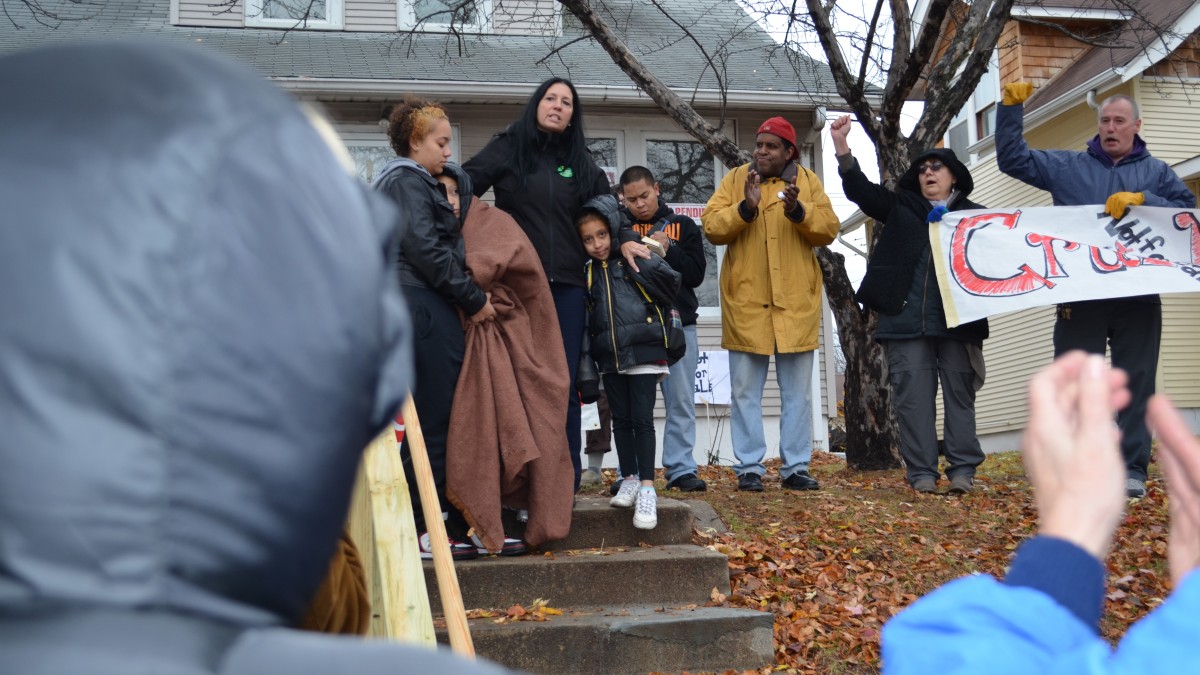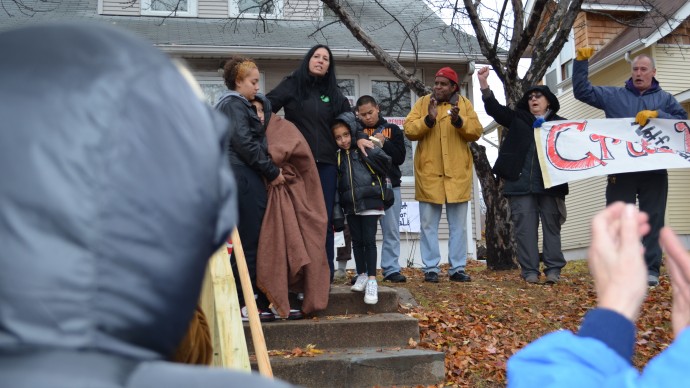
Minneapolis – Green Party vice presidential candidate Cheri Honkala joined dozens of passionate community members on the front steps of a South Minneapolis, Minn. home Thursday evening to stand up against a foreclosure process that could force one family out on the streets.
“I bring greetings from poor and homeless from across the U.S. who are fighting back,” Honkala said to the eager crowd, sharing her own story as the first formerly homeless vice presidential candidate in U.S. history.
The atmosphere of activists gathered mirrored a family gathering with a purpose, rather than a simple protest. Since May, activists associated with Occupy Homes Minnesota have dedicated themselves to the cause of fighting on behalf of the Cruz family.
Together, activists taped signs to the Cruz family home, depicting the message that this home wasn’t on the market. Women associated with the movement waved T-shirts and signs advocating their cause — and drivers passing by honked their horns in support.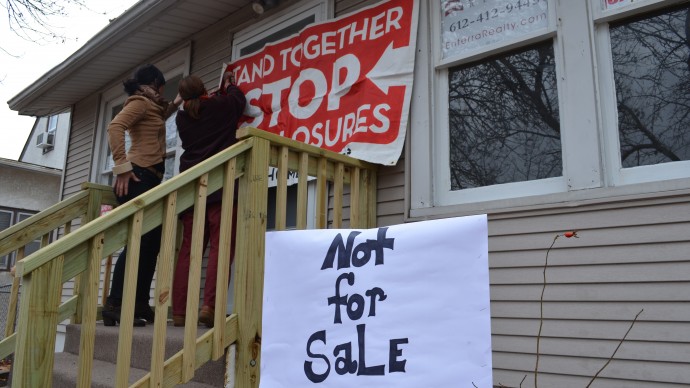
The only thing missing from the rally Thursday evening was the presence of police, which has become an expected component of gatherings at the Cruz family home. In all, 37 people have been arrested since Occupy Homes began advocating for the family. Some have been arrested for “crimes” that stem from the simple action of holding a sign on the street.
Despite the knowledge that many of those who gathered faced yet another arrest simply for showing up, they made their presence known. Not only in support of the Cruz family, but also in support of all families around the nation who are facing similar battles with big banks.
The struggle of the Cruz family
David and Alejandra Cruz were not present at Thursday night’s rally — they were spending their evening working. In their place were the dozens of community activists who share their struggle.
That battle for the family began after seven years in their house, when one online payment did not process — an action they say the bank is responsible for. At that point, they found themselves two months late in their payments. While fighting to work their way out of that hole, they were given notice from PNC Bank that it was over — their home was being foreclosed.
After working with a nonprofit to negotiate a loan modification plan with the bank, the Cruz family felt that they were on the right track. That changed in February, when a PNC bank employee came to their home and told them to get out. They had 48 hours. Since then, they’ve been working with Occupy Homes Minnesota to win the fight.
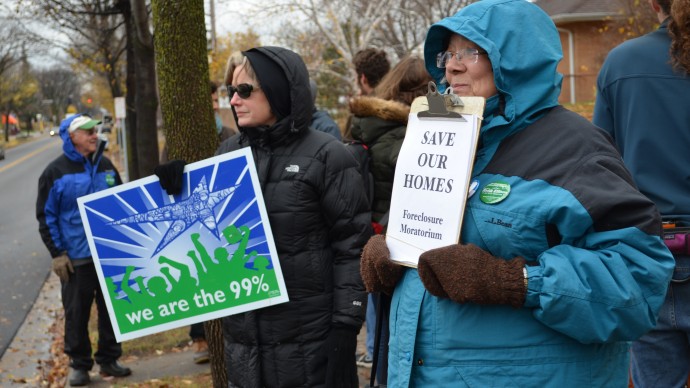
Occupy Homes launched a public pressure campaign on PNC bank, gaining national attention and working their way toward an agreement with the institution. While PNC is willing to finance the home at a principle reduction rate, Freddie Mac, the bank that technically now owns the home, will not negotiate with the Cruz family.
Activists associated with Occupy Homes Minnesota are no stranger to the tangled foreclosure web. Even before joining forces with Occupy, some were mobilizing to save others from unfair evictions. And they’ve seen success. Many who gathered Thursday night served as examples of victory. They had benefited from those within their city who recognized that when one home goes under, it impacts an entire community.
Individual action becomes a movement
Mark Freeman, a hospital worker and part-time union organizer, stressed how home foreclosure necessitates a collective community response.
“I went through it, I understand how hard it is. One foreclosure affects a whole neighborhood. We have to look out for each other,” Freeman told MintPress.
While critics have labeled the Occupy movement as nebulous, lacking a clear direction or cause, community activism around this issue has been relatively focused, building upon the close working relationships of neighbors.
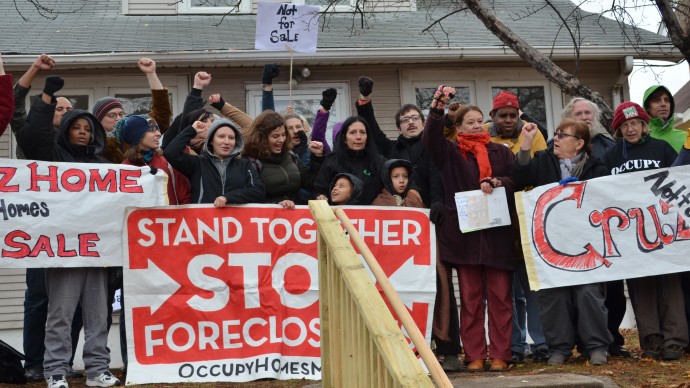
Caylin Crawford successfully negotiated a loan modification with U.S. Bank and Freddie Mac after more than 18 months of sustained community action.
“I was able to engage in a dialogue,” Crawford told MintPress. “Fannie Mae and Freddie Mac are faceless quasi-governmental entities. They have no interest in keeping people in their homes.”
However, Crawford, like many on hand for the Thursday event believe that it is important to advance the movement and push for legislative reform on a city level to keep families in their homes.
“We are trying to move from individual action in an effort to create a movement,” she said. “We are working on enacting a moratorium on home foreclosures across Minneapolis. Many of us have been working with neighborhood assemblies and local politicians to make this happen.”
The issue of home foreclosure is one that affects millions of families across the U.S. According to a recent Truthdig report, “banks have shuttered more than 8 million homes since 2007.” This has led to an increase in homelessness across America as more than 3.5 million are without shelter, many of them veterans.
While President Barack Obama and Republican challenger Mitt Romney did not discuss the issues of homelessness, poverty and home foreclosure, third party candidates have incorporated the messages of Occupy Homes activists and others pushing for a moratorium on evictions.
Success and the evolution of a national movement
Honkala, a native of Minneapolis, has been advocating for anti-poverty campaigns for more than 25 years.
“I have been working on this for a long time. We are tired of banks throwing families out of their homes,” said Honkala. “We are anticipating one million more families who will face home foreclosure. If they chose to stay in their homes, what could the banks do?”
While critics have previously labeled the Green Party as a “spoiler,” siphoning off votes from Democratic candidates, Honkala encouraged the crowd to vote their conscience and not choose the “lesser of two evils” this election season.
While the Green Party generally receives 1-3 percent of the vote in national elections, Honkala remained hopeful that movements like Occupy can endorse the Green Party and build a cohesive movement that will have an impact on the national level.
The anachronistic electoral college and unregulated financing of elections remain major hurdles for the Green Party and other third parties. However, Honkala stressed that issues like home foreclosure can mobilize communities in action that will eventually have an impact on presidential campaigns.
“Sections of the Occupy movement are thinking of endorsing our campaign. We need a social movement connected with a political party that is free of corporate interest,” Honkala told MintPress following the rally.
The plight of the Cruz family and millions of others struggling with home foreclosure has highlighted the fundamental failures of the 2008 financial collapse: lack of federal oversight regulating the actions of Wall Street banks. With few reforms since the start of the foreclosure crisis, families, including those across Minneapolis communities, have started the push for necessary reform, preventing homelessness while advocating for enduring systemic reform — one house at a time.


